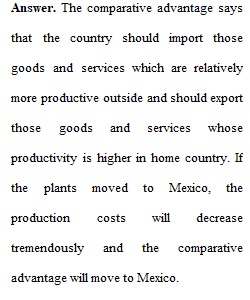


Q Q.1. In the public debate over the ratification of the North American Free Trade Agreement, Ross Perot said he heard a “giant sucking sound” from U.S. jobs heading south because of low wages in Mexico. Using the theory of comparative advantage, discuss whether Perot’s fears are valid.Q.2. Hyundai decided to build a new automobile assembly plant in Alabama. a. What factors do you think Hyundai considered in selecting Alabama as the site for the factory? b. Who benefits and who loses from the new plant in Alabama? c. Is the firm’s decision to build the new plant consistent with Dunning’s eclectic theory? Q.3. What parallels exist between the role of the British Pound in the nineteenth-century international monetary system and that of the U.S. dollar since 1945?Q.4. Under what conditions might a country devalue its currency today?Q.5. What connections exist between the current account and the capital account?
View Related Questions